Meaty and Marbled: The Best Grass-Fed Steak You Can Buy Online
No offense, standard grocery meat, but nothing beats a well-marbled, grass-fed steak. In fact, among all high-protein meat, it's arguably king.
Not only does grass-fed steak look more appealing—even in its raw state—those webs of white fat running through the cut finish off juicier, meatier, and more flavorful.
What Is Grass-Fed Steak?
An estimated 97 percent of cattle raised for beef in the U.S. are sequestered in dirt or concrete feedlots where they're penned in and fed mostly a diet of grain—generally corn—when it's time for the finishing phase at nine to 15 months old, according to Stone Barns Center for Food & Agriculture. They then gain weight rapidly and are slaughtered at 16 to 20 months.
Grain-fed cattle sometimes have an imbalance in the levels of E.coli bacteria in their gut and digestive tract due to grains contributing to a more acidic environment in the cow. According to the USDA, over 73 percent of large cattle operations report using subtherapeutic doses (a concentration lower than that prescribed to treat a disease) of antibiotics in their cattle feed as a “health or production management tool.” This more liberal use of antibiotics in grain-fed beef can lead to the proliferation of antibiotic-resistant strains of bacteria that can infect humans, research suggests.
Grass-fed cattle raised on pasture don't need to be administered these subtherapeutic doses of antibiotics to remain healthy, per the USDA. In a study, the USDA found grass-fed beef was three times less likely than conventional beef to contain drug-resistant bacteria.
A cow's natural habitat is wide-open, grassy plains where they can roam freely and feed on a variety of pasture grasses like bluegrass, ryegrass, fescue, and sorghum. Cattle's diet can also include non-grass plants like legumes—alfalfa, birdsfoot trefoil, and a variety of clovers. And 100 percent grass-fed cows will also consume other naturally occurring vegetation along with a variety of the plants mentioned, leading to a lifetime of a well-balanced diet.
Related: 100 Healthiest Foods With the Highest Protein
Are Grass-Fed Steaks Better?
In general, grass-fed steak is better, both for your health and the environment. Grass-fed steaks contain up to five times more omega-3 fatty acids than grain-fed beef; have lower levels of saturated fat (see lean meats list for more alternatives); and are a great source of protein, especially when you opt for the healthiest cut of steak (think sirloin tip, top round, and eye of round).
Most grass-fed operations have proven to be a more ethical and environmentally sound way of raising cattle. In general, fields of grass promote land and soil biodiversity, as well as drought resistance while inhibiting floods. Moreover, grass-fed beef production can sequester carbon, which helps offset methane emission and reduce greenhouse gas levels.
Is Grass-Fed Steak Expensive?
Pound for pound, grass-fed steak is more expensive than regular feedlot beef you get at the grocery store. This is because eating an all-grass diet means fewer calories are taken in overall compared to what a grain-fed cow consumes. It takes longer for grass-fed cattle to reach their processing weight.
That means more money is spent to care for them and they weigh less when it's time to go to the slaughter house. Grass-fed cows usually top off around 1,200 pounds while grain-fed cattle can weigh over 1,300 pounds, according to research from Stone Barns. The rancher that sticks to producing grass-fed steak will not get as much meat to sell compared to grain-fed beef.
No question, grass-fed steaks are the healthier and tastier choice for grilling. So where do you splurge on some? Here's where to find the best grass-fed steak online.
Where to Buy the Best Grass-Fed Steaks Online
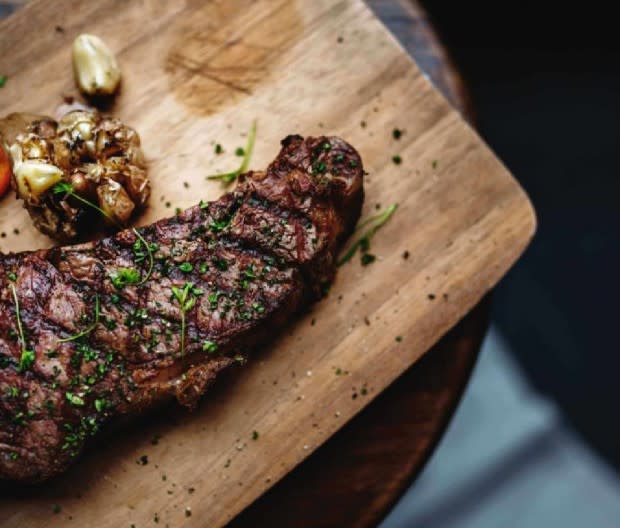
Courtesy Image
1. Verde Farms
During a trip to South America, the founder of Verde Farms was so inspired by how reverently the gauchos (cowboys) treated and raised their cattle—he adopted their tenets: Respect the animals. Honor the land. Value family, simplicity, and integrity.
The company now sources its USDA organic, 100 percent grass-fed, grass-finished beef from just a few family farms in Uruguay—one of the world’s top grass-fed beef producers. Free-range and antibiotic- and hormone-free, Verde Farms products also include ground beef, patties, roasts, and stew meat.
Price Rating: $
[From $11; verdefarms.com]
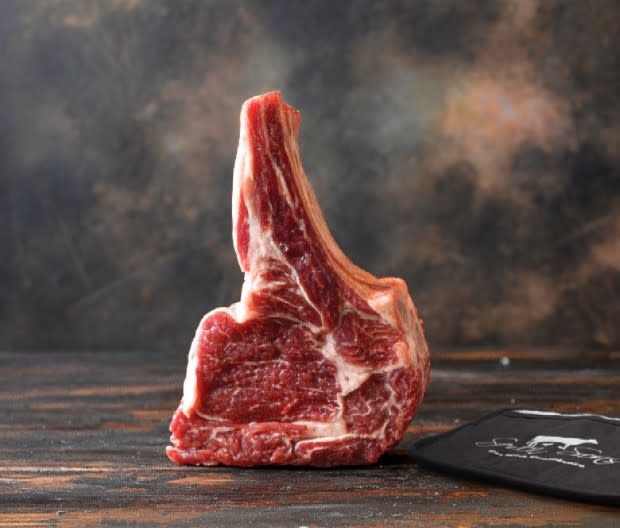
Courtesy Image
2. Seven Sons Farms
This family farm (yes, with seven sons) was a conventional farm employing standard industrial agriculture practices 25 years ago. But, after a family health crisis hit them, they reevaluated what they were doing and switched up to a regenerative pasture-base farm that raises livestock ethically: humane conditions with access to pastures and natural diets.
To keep their herd with enough grass and hay to eat, even during cold Indiana winters when snow blankets the ground, they stockpile loads of grass during the summer and bale their own hay during the growing season to feed their cattle. Aside from grass-fed steaks, the family also sells pasture-raised pork and poultry, grass-fed lamb, eggs, offal, bones, bison, and wild-caught seafood.
Price Rating: $
[From $11; sevensons.net]
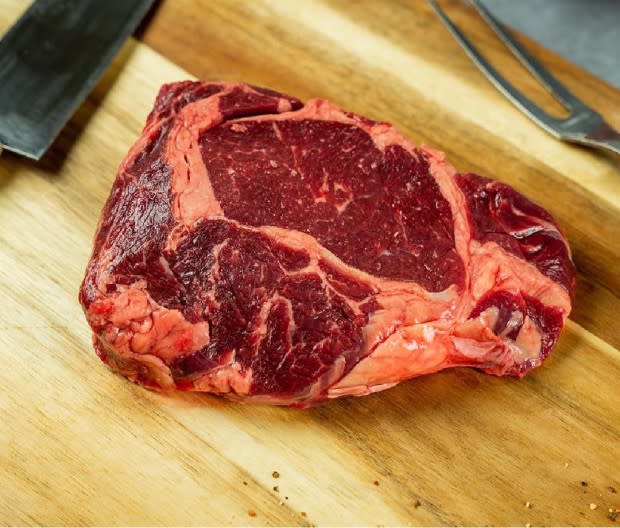
Courtesy Image
3. White Oak Pastures
Based in Bluffton, GA, this former industrial farm began switching over to regenerative farming practices over 25 years ago. Emphasizing organic and holistic farming, White Oak Pastures ethically raises 10 species of livestock, while making efforts to capture soil carbon to neutralize greenhouse gas emissions from cattle.
A zero-waste farm, the company uses every part of an animal after processing. Hides are dried for pet rawhide or made into leather, fat is rendered down for tallow, and other parts are composted to serve as fertilizer.
In addition to grass-fed steaks, several other premium meats are sold here—including poultry, lamb, heritage pork and Iberico pork, plus specialty meats like bison, boar, elk, and gator.
Price Rating: $$
[From $21; whiteoakpastuers.com]
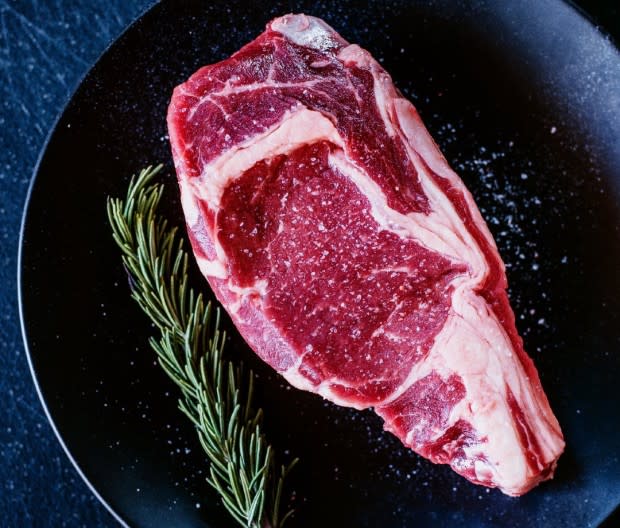
Courtesy Image
4. Alderspring Ranch
This cattle ranch is run family-style with seven daughters in tow over 46,000 acres of rangeland near May, ID.
The Alderspring Ranch crew is dedicated to raising cattle according to the animal husbandry method—a timeless technique requiring close attention to livestock's natural tendencies, meeting animal needs on their own terms. They also practice "stockmanship"—the art and science of proper herding.
Beef is purely grass-fed, certified organic without the use of antibiotics, growth hormones or GMO crop feeding. Lamb, pork, poultry, dairy, and a home-grown jerky line called Wild Cow are also available.
Price Rating: $$
[From $23; alderspring.com]
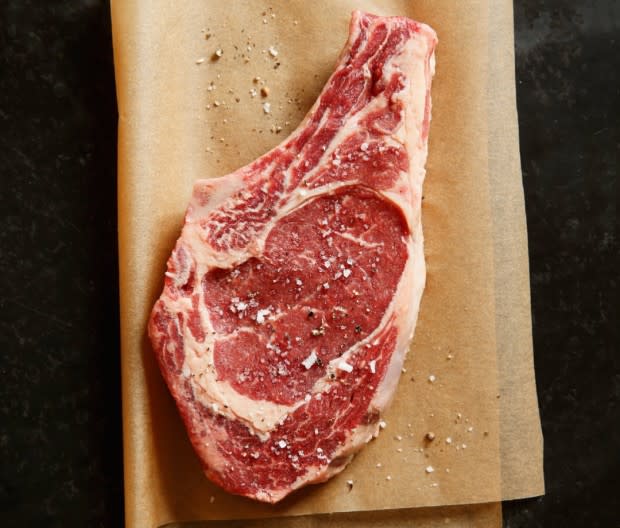
Courtesy Image
5. Carman Ranch
This small group of Oregon ranchers was spearheaded by a multigenerational family raising cattle in the state for over a century. Carman Ranch and its five producers are fully dedicated to regenerative farming practices that sequester carbon while restoring and building soil utilized for livestock production.
All animals are grass-fed and grass-finished on free-range pasture, and never fed antibiotics or hormones. In addition to all cuts of steaks, Carman Ranch sells lamb, poultry, pork, bone broths, hot dogs, beef sticks, and hook-and-line caught tuna and cod.
Price Rating: $$
[From $16; carmanranch.com]
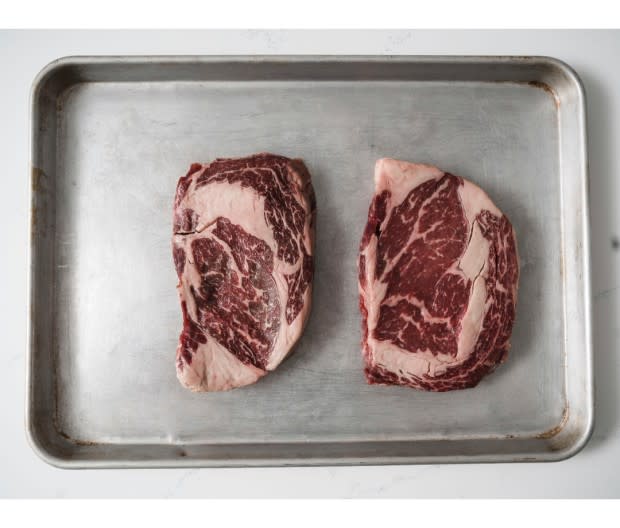
Courtesy Image
6. E3 Ranch & Co.
E3 Ranch & Co. was founded by MLB first baseman Adam LaRoche, because he wanted to be sure his growing kids were eating quality meats. E3 Ranch partners with small family ranchers who are dedicated to raising 100 percent Angus cattle without steroids or added hormones or antibiotics. All ranches adhere to holistic management by rotating the livestock through the fields to ensure fertile soil and healthy cattle.
After the grass-fed, grain-finished cows are slaughtered, the cuts are aged wet for 28 days, then trimmed by the on-site butcher. After flash freezing, cuts of meat, ground beef, and family-size packages are shipped anywhere in the U.S.
Price Rating: $$
[From $99 for 6; e3ranch.com]



